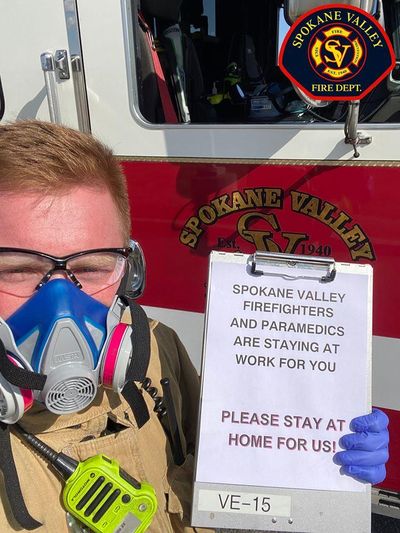‘We know what our job is’: Spokane Valley firefighters adjust to widespread COVID-19 precautions

Spokane Valley firefighters are growing used to the unprecedented, widespread precautions they’re taking to protect themselves and the public from the spread of the novel coronavirus, while grappling with the danger of the uncertain situations they find themselves in.
“We know what our job is,” said paramedic Marc Lange, a five-year veteran of the department.
Anyone who contacts a patient is required to wear a face mask and eye protection, according to Battalion Chief Brian Foster-Dow. First responders wear respirators and gowns in addition to that gear if they suspect the patient has COVID-19.
“We’re going to have to get to the point where we assume someone’s got (COVID-19) until proven otherwise,” said Capt. Don Kresse, who was filling in as battalion chief Saturday morning.
As of Sunday evening, two Spokane Valley firefighters were quarantined due to potential exposure to the novel coronavirus, according to department spokesperson Julie Happy.
Firefighters and paramedics check their temperatures and evaluate themselves for potential symptoms of COVID-19 before starting any shift, Happy said. Foster-Dow said self-monitoring continues throughout the day.
Lange said he doesn’t do anything special at the end of a shift, but if there is an exposure concern, first responders clean themselves and launder their clothes while limiting contact inside the station.
“We are the doctors in the big red truck, and it isn’t going to stop any time soon,” Kresse said. “We’re trying to take care of the issue and protect ourselves at the same time as much as possible.”
Kresse said miscommunication of information from a 911 caller to firefighters through dispatchers, like a game of telephone, can make it difficult to go into a situation fully informed, especially if a caller leaves out vital details. Kresse said people have left out serious health conditions like diabetes and heart diseases when talking to dispatchers and medical personnel.
Dispatchers also have new directives for pandemic calls when a caller reports fever, cough or shortness of breath, Kresse said. The dispatcher then runs through a special set of questions to prepare the first responders.
Foster-Dow said people should stay home as much as possible and consult their doctors about illnesses if their symptoms are manageable from home.
“If you are truly sick, do not hesitate to call. That’s why we’re here,” Kresse said.
Diseases like MRSA, SARS and Ebola have threatened to impact the fire service in the Spokane area before but never materialized locally, said Foster-Dow and Kresse, who have worked in the fire service for decades.
Kresse said he’s encouraged his station to order takeout for meals, rather than cooking, in order to support suffering local businesses.
Foster-Dow said he senses some uncertainty in his firefighters about how COVID-19 will progress.
Lange said Station 3 in Liberty Lake feels a little busier than usual, but partially because of the increase in medical calls that become pandemic calls as a precaution. Kresse and Foster-Dow said call volume is typical for the department.
“We’re just being more prepared,” Lange said.
But as far as day-to-day operations, the COVID-19 pandemic doesn’t change how firefighters approach their jobs.
“We are just here to serve. This is what we do,” Foster-Dow said.
“You focus on the task at hand and you keep moving forward,” he said. “There are times where we’re going to have to go all in, and that’s just the nature of the business.”